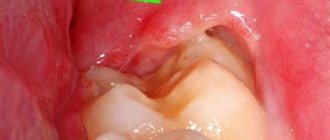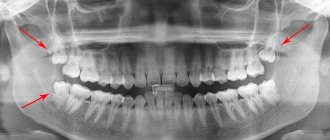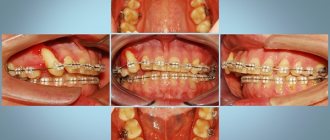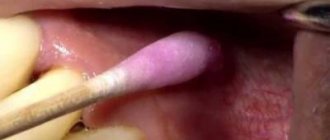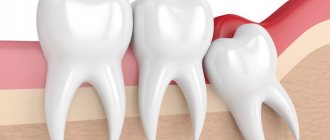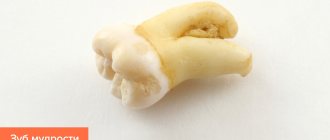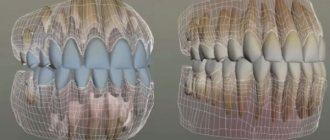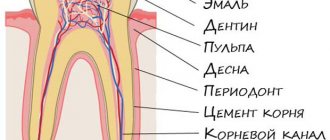For many people, rotten wisdom teeth pose a real and very serious threat to the health of the entire oral cavity - problematic third molars or, as they are also called, “eights” cause a lot of trouble for their owners. They erupt much later than the rest of the dentition (at about 20-25 years) and often become a problem already at the eruption stage.
What complications can wisdom teeth cause?
Difficulties arising from third molars are primarily associated with the late timing of their eruption and some anatomical features of the jaw structure:
- Lack of space for normal eruption. By the time the “eights” begin to cut, a person’s dentition is usually already fully formed, and there may simply not be enough space for the third molars. In addition, during evolution, the human jaw has decreased by about 1 cm, which also does not contribute to the normal growth of “eights”. In this case, tooth extraction is indicated to prevent displacement of the entire dentition.
- Incorrect position in a row (dystopia). Leads to soft tissue injuries, destruction and displacement of adjacent teeth.
- Incomplete eruption (retention). Impacted “eights” cause a lot of problems and discomfort - often such a wisdom tooth causes inflammation of the gums and diseases of the “neighbors” in the dentition.
- Pericoronitis. An inflammatory disease characterized by swelling of the gums near the wisdom tooth followed by suppuration. When teething is difficult, a so-called hood of mucous membrane is formed around the figure eight, which is the optimal place for the accumulation of food debris and the proliferation of bacteria. In this case, the wisdom tooth is cut and hurts due to inflammation of the hood. If nothing is done, gum inflammation develops not only next to the tooth, but throughout the entire jaw - this will require long-term and costly treatment of the gums.
- Deep caries of wisdom tooth. Third molars, as a rule, begin to deteriorate quickly, often at the eruption stage. Why do wisdom teeth crumble? This is due to both the peculiarities of its structure and its position: it is simply impossible to clean the “eights” well with paste and a brush, so food debris and bacteria necessarily accumulate there, creating favorable conditions for the development of infectious processes.
In all the described situations, it is better to remove wisdom teeth immediately, without waiting for serious complications to develop, and you will have to spend a lot of time and money on treating nearby teeth, as well as inflamed gums.
Should I delete or not?
Yes. If diseases or complications have already arisen. Or the situation with 3 molars creates a high risk of diseases and their complications. Such cases include:
- lack of space in the dentition. Crowding – deformity – malocclusion;
- incorrect anatomical position (dystopia). The tooth grows towards the cheek, tongue, throat. May damage mucous membranes and cause ulceration;
- installation of braces to correct the bite. Freeing up space for other teeth;
- destruction of a neighboring tooth. As the tooth grows, it can damage the adjacent molar;
- problems with eruption (retention).
No. The teeth are healthy, there are no problems and no problems are expected.
Special attention. Long business trips, pregnancy, any situations that limit the possibility of providing medical care. Before these events, it is better to get advice and assess the risks, because treatment often requires surgery.
Can third molars be treated?
Wisdom teeth, like any other teeth, can be treated. But only if they erupt correctly, do not threaten the health and position of the rest of the dentition, and there is confidence that the treatment will be successful. If the specified conditions are met, it makes sense to preserve the “eight” for the following indications:
- If the sixth and seventh teeth are sick or severely damaged and must be removed, in this case the wisdom tooth is left as “the best of the worst” in order to provide the patient with at least some conditions for chewing, and the doctor - the basis for future prosthetics.
- If the six and seven have already been removed and it is necessary to preserve the abutment tooth for installation of prosthetic structures.
- In the presence of an antagonist tooth, completely healthy and subject to preservation.
In case of curved roots that complicate endodontic intervention, severe tissue destruction, dystopia or retention, no competent dentist will undertake to treat the “eights” - he will definitely recommend removal.
Growth period of eights
The average growth period for wisdom teeth is 18-25 years. But they may not erupt at all, and even their rudiments will not be formed inside the bone tissue. In some situations, they can form completely, but remain inside the bone. According to research, approximately 70-80% of the world's population still grows the outermost teeth.
Growing pains
Only some lucky people have wisdom teeth that grow completely, straight, and do not cause any trouble during eruption. Among the main problems that accompany their growth are the following:
- Impacted or semi-impacted teeth, which have formed completely inside the bone tissue, but have not erupted (or partially appeared). They can be vertical, horizontal, or even with their roots up. When positioned laterally, such teeth very often exert increased pressure on neighboring ones, which leads to acute pain,
- A gingival hood forms above the tooth: this is a small area of the mucous membrane that forms during the slow eruption of the tooth. The difficulty is that bacteria and food debris often accumulate underneath it, which are difficult to remove due to the fact that the tooth is very far away - it’s practically impossible to get to it. This causes acute inflammation, which often develops into purulent,
- dystopia or positional imbalance: eights do not have milk precursors, in addition, they grow at a time when the jaw bone has ceased to develop and form. Therefore, they often grow crookedly and do not stand in place. At the same time, they can overlap other crowns, overlap with neighbors, cause injury to the mucous membrane, which will complicate hygiene and provoke inflammatory processes,
- growth immediately with caries: they are very difficult to clean because they are located far away. Patients experience particular difficulties when the mucous membrane is inflamed, since cleaning in such situations is accompanied by acute pain.
In general, growth disturbance leads to a change in the normal functioning of the entire dental system. Soreness occurs, the patient often complains of pain when opening the mouth and moving the lower jaw. Due to pressure on neighboring teeth, they become displaced and cause malocclusion. A fairly common consequence is crowding of the incisors, which occurs precisely as a consequence of impaired growth of the figure eights.
Why are wisdom teeth needed?
Why does our body need third molars at all? In fact, these are rudiments that not all people today erupt - approximately a third of the entire population of the planet does not even have the rudiments of third molars, although a few thousand years ago absolutely all adults grew wisdom teeth. They practically do not perform the chewing function, since the rest of the healthy teeth usually cope with it.
Today, “eights” are needed only as a “backup option” in case the first and second molars fall out or are severely damaged, and also as a factor preventing the loosening of neighboring teeth. They can also serve as a support for prosthetics - but, again, in all these cases we are talking about healthy and correctly erupted “eights”. In the same case, when a person has rotten wisdom teeth in his mouth, they will not be able to perform any of the indicated functions and it is better to remove them so as not to expose the rest of the dentition to the risk of infection.
Removing "fours" or "sixes"
Sometimes, before installing braces, the patient needs to have the “fours” removed, that is, the first premolars - they have the smallest roots, so they are the easiest to pull out.
In addition, they bear less chewing load than, for example, molars, so their loss will not affect the patient’s health. The third candidate for removal is the fifth teeth. They are slightly larger than the “fours”, but the gaps left after their removal are practically unnoticeable when talking and smiling. Frontal teeth and canines undergo extraction much less frequently. “Sixes” are removed as a last resort, since they are quite difficult to remove, and the holes left behind them take a long time to heal. As for the seventh tooth, it is pulled out only if there is a healthy eighth tooth, in order to shift part of the load onto it. In addition, which teeth need to be extracted depends on the type of bite.
✔
In case of crossbites and distal bites, premolars, that is, either the fourth or fifth teeth, are most often removed.
✔
In case of an open bite associated with severe crowding and/or protrusion - protrusion of one of the jaws, removal of the upper and lower premolars, and at a very young age, also the canines, is indicated.
✔
As for the mesial bite, to correct it, the lower incisors are eliminated - in case of underdevelopment of the upper jaw - or “eights”.
Important!
A competent specialist, regardless of the indications, will always prefer to remove a diseased or decayed tooth rather than a healthy one.
Indications for removal
Healthy, well-positioned third molars with good oral access for possible treatment do not need to be extracted. There are clear indications for such an operation, and if they exist, it should be removed without waiting for complications:
- Deep caries of the wisdom tooth, as well as lack of normal access for full treatment.
- Chronic inflammatory processes caused by third molars, including in cases where the wisdom tooth caused inflammation of the gums.
- Chronic injuries to the oral mucosa due to incorrectly positioned “figure eight”.
- Impacted or dystopic teeth.
- The need for orthodontic treatment of bite defects if the doctor believes that the “eights” will prevent the dentition from occupying the correct position.
In all of these situations, it is recommended to remove the “eights” without delay.
Tooth extraction before installing braces and treatment time
In most cases, contrary to popular belief, extraction does not increase the treatment time, but, on the contrary, shortens it. For example, if the patient has severe crowding, then extraction will speed up the process of moving teeth by at least a couple of months, if not more. However, if the situation allows you to do without removal, then the fate of the tooth depends on the patient’s decision. In addition, you should not be afraid that after extraction there will be gaps between the teeth - they will close during orthodontic treatment. Usually it takes from three months to six months to eliminate them, depending on which tooth was removed. The gaps close at a rate of approximately 1 mm per month, so the smaller the tooth removed, the faster they will heal. As mentioned earlier, the smallest holes remain after removing the “fours”. Extraction is usually performed a week before braces are installed.
Important!
Removing an inflamed tooth during orthodontic treatment can negatively affect the timing of correction, therefore, before installing braces, the oral cavity must be completely sanitized.
Removal Features
As a rule, operations to remove third molars are always considered difficult, since these are the teeth that usually cause more problems. The operation can be simple, provided that the “figure eight” is located on the upper jaw and does not have pronounced developmental abnormalities. In all other cases (as well as in situations where the tooth is in the upper jaw, but has strong, curved and branched roots), the operation is considered complex and must be performed by a qualified dental surgeon.
Before performing an intervention, the doctor determines possible contraindications for a particular patient, examines an x-ray of the problem area and determines the optimal tactics for the operation. The duration of the procedure ranges from 1-10 minutes for simple removal and up to 20-120 minutes for complex removal, requiring a series of manipulations and suturing of the hole.
Does it make sense to wear braces without removing teeth?
As we have found out, removal is required in cases where there is not enough space in the jaw for the correct arrangement of teeth. Unfortunately, without extraction in such situations, orthodontic treatment will be ineffective. The teeth, taking the desired position, will either be forced to shift their inclination, or simply will not budge. Only timely orthodontic treatment in childhood will help to avoid removal.
Publisher: Expert magazine about dentistry Startsmile.ru
Author of the material: Yaroslav Ikonnikov
Removal of wisdom teeth under general anesthesia
Many patients are afraid to remove problematic “eights” because they fear that the process will be painful. However, you should not postpone the operation because of your own fear: modern methods of anesthesia allow the removal to be performed as painlessly and comfortably as possible for the patient.
Doctors usually recommend performing the intervention under local anesthesia, which will be sufficient to ensure the patient is comfortable during the operation. If for some reason a person is not satisfied with the methods of local anesthesia, there is always the possibility of having a wisdom tooth removed under anesthesia. It should be remembered that this option of pain relief is not available to everyone - there are certain contraindications:
- Decompensated diabetes mellitus and cardiovascular diseases.
- Post-infarction or post-stroke periods for up to 6 months.
- Acute inflammatory diseases of internal organs, including the respiratory system.
- Epilepsy.
- Severe thyroid disease.
- Bronchial asthma.
- Alcohol or drug intoxication.
The presence of at least one of the listed positions makes the removal of wisdom teeth under general anesthesia impossible. Before the operation, the patient must be examined to identify any contraindications to the use of anesthesia. In addition, you need to remember that certain preoperative preparation will be required, and the clinic itself, in which the wisdom tooth will be removed under anesthesia, must have all the necessary equipment, as well as a team of specialists who will treat and monitor the patient’s condition (anesthesiologists, resuscitators, trained nursing staff).
Why do you need to clear your phone's memory?
A smartphone is a thing that a person uses every day. In this regard, it is important to ensure that the device operates stably. After all, even the slightest lags lead to a deterioration in the perception of content.
An important factor that affects the speed of operation is the phone's memory. Typically, users mindlessly fill up storage with files, but this leads to a drop in performance. In addition, the useful space is gradually filled with cache, which does not play a serious role.
Advice. For stable operation of the smartphone, it is recommended that the amount of free space be at least 20% of the total internal storage.
Treatment or removal during pregnancy
In cases where a wisdom tooth is cut and hurts, causing constant discomfort to the pregnant woman, it can and should be treated regardless of the gestational age. If there is no acute pain and treatment can be postponed, then it is advisable to carry it out in the second trimester of pregnancy or after childbirth.
It is worth remembering that wisdom tooth removal, especially under anesthesia, is definitely contraindicated for pregnant women. Removing third molars is strongly not recommended due to the complexity of such an operation and the risk of developing postoperative complications. As for anesthesia, it cannot be used either for removal or for treatment - during pregnancy, only local anesthesia can be used, and the drugs should be selected very carefully and taking into account the patient’s condition.
Despite their name, wisdom teeth do not bring their owners increased intellectual abilities, but they can cause a number of very unpleasant problems with oral health. Typically, third molars “lead with them” swelling of the gums, purulent inflammation, the development of caries of neighboring teeth, as well as severe pain. Therefore, in modern dentistry they prefer to remove them, without waiting for serious complications to arise and longer and more expensive treatment to be required. In many European countries today, a common practice is to remove the “eights” immediately after their appearance, regardless of their condition and the correctness of eruption.
FAQ
Is it painful to remove a wisdom tooth?
No, the operation is performed under local anesthesia, which relieves pain. Dental surgeons use potent analgesics - a solution of lidocaine, ultracaine, etc. To remove several “eights” at once, general anesthesia is used. You will not feel any physical discomfort during treatment “in your sleep”.
Is it necessary to remove a wisdom tooth if it doesn’t hurt?
The absence of pain does not mean that the tooth is healthy. For example, chronic caries or cyst formation are practically asymptomatic. Only after a visual examination and x-ray diagnostics will the doctor make a conclusion.
Why remove wisdom teeth before installing braces?
It is problematic third molars that are often the cause of crowded incisors and other deformities. Orthodontic correction with braces involves moving teeth to align the entire row. Third molars interfere with this process, so they are eliminated. This is common practice.
Is it possible to remove the “eight” during pregnancy?
No you can not. The operation ends in complications in 50% of cases, which is dangerous for the life and health of the baby. Therapeutic treatment is recommended. It is better to do this in the 2nd trimester, when the fetus is reliably protected by the placenta. But in case of severe pain, consult a doctor.
